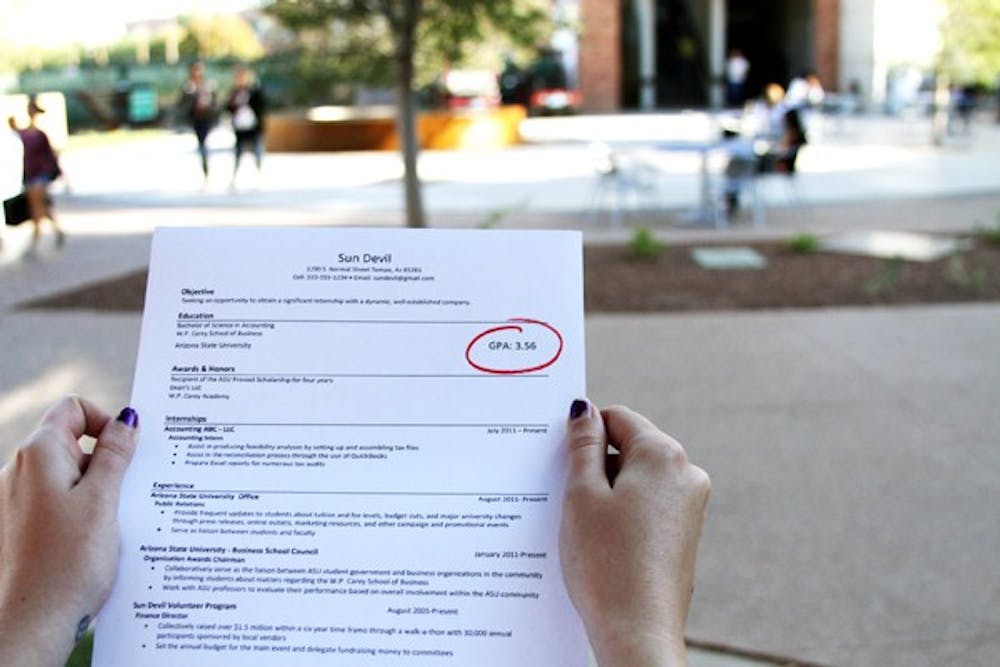College students who obsess about a 4.0 GPA or those who neglect it entirely may both be in for a surprise — a weak GPA will get a candidate’s application in the trash, but a strong one alone will not snag a job.
“Some jobs will look for GPA at a certain level and they will screen you out,” said Kevin Burns, director of ASU’s Undergraduate Business Career Services.
In an article published by the National Association of Colleges and Employers Journal, 73 percent of respondents to the publication’s 2012 job outlook survey said they filter candidates by GPA with an average cutoff of 3.0 out of 4.0.
Burns said GPA is only one segment of a three-part package including experience and networking for job connections.
“You can overcome a bad GPA if you’ve got relationships with people who have the ability to hire you for something you want to do,” he said.
Burns said he warns students against focusing only on the Internet for positions. He said around 90 percent of the jobs graduates want will never be posted online, so students should reach out to their professional contacts rather than just applying online.
He said the importance of GPA varies depending on the field a student wishes to enter, noting that consulting, investment banking and accounting are the most highly interested in GPA. Burns said candidates are expected to have a 3.5 or higher for financial positions.
However, for advertising and sales positions, Laurie Kahn, president and CEO of Scottsdale-based Media Staffing Network, said most of her clients typically don’t see GPA as a make-or-break factor.
After working with radio stations, TV, magazines and other media outlets for 19 years, Kahn said most companies look at personality over education.
“I’d rather see a B-student that has really good extracurricular, leadership and social skills than see someone with a 4.0 that spent their whole college time in a dorm,” Kahn said.
Across the board, most companies want to see social skills and leadership for marketing positions — not GPA, she said.
Gina Nelson, owner of Hire Resolutions LLC, which recruits for Arizona companies, said employers who hire college grads from a pool of liberal arts and general business majors seek people who have completed their degrees.
“If it’s 3.5 or higher I do recommend that people put GPA on their resume,” Nelson said, though she said it’s often not specifically asked for anymore.
Burns said GPA does show employers one particular talent.
“GPA is to an employer an indication of an individual’s ability to learn under pressure,” he said. “If there’s a lot to learn in this new job, that’s going to be a signal that GPA matters.”
Burns said a 3.0 is generally sufficient for most jobs.
As for students who’d rather not display a lackluster cumulative GPA, Nelson suggested showcasing the GPA within degree-specific courses.
“That might be a nice way to communicate a higher-level GPA,” Nelson said.
Even students with top GPAs cannot coast into graduate school or careers.
Joey Amonett, a criminal justice and criminology junior, has a 4.0 GPA, but he said his admission to law school is not guaranteed.
“The way it works for law school, I feel there’s more weight added on the LSAT than your GPA,” Amonett said.
More than half of law admissions officers, 64 percent, reported that the LSAT score is the most important admissions factor, according to Kaplan Test Prep’s survey of law admissions officers from July to August 2010.
Amonett said he also has extracurricular experience under his belt including a tutoring job, serving as a college senator for ASU’s Undergraduate Student Government Downtown and holding an executive board position in Delta Upsilon International Fraternity.
“I feel like I have a pretty well-rounded package (but) it is kind of annoying because so much weight is added onto the LSAT,” he said.
Meeting requirements is only part of a candidate’s appeal though.
All three experts said the most important thing students can do is read the job description and tailor each piece of their resume and application to that specific job.
“Most resumes that you submit get scanned and they have basic levels of accept (or) do not accept,” Burns said.
Nonetheless, Nelson said she sees the job market opening up and favoring graduates.
“I see hiring authorities looking for a college graduate that understands and is professionally educated in the latest and the greatest,” she said.
Reach the reporter at sksmith9@asu.edu https://mail.google.com/mail/?shva=1#starred/1323ce1580e09fac





